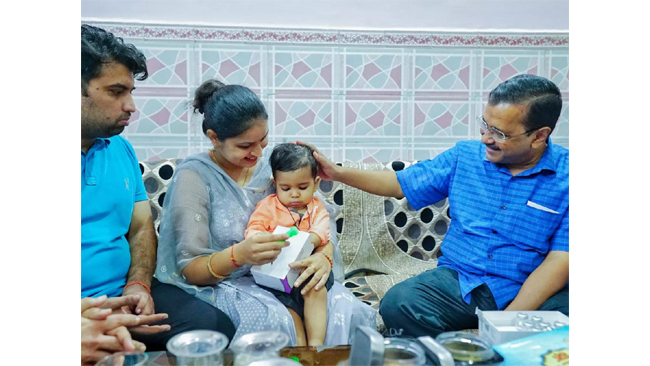
Spinal
Muscular Atrophy (SMA), a rare genetic disorder that affects the motor neurons
in the spinal cord, has emerged as a pressing concern in India, demanding
immediate attention from healthcare authorities and policymakers. SMAposes
severe challenges to patients, caregivers, and the healthcare system, and its
economic burden cannot be ignored.
It
is heartening to note that Delhi CM Arvind Kejriwal's recent support for a
child with SMA has touched the hearts of many. The AAP government's commendable
initiative to promote and support a crowdfunding drive, with a strong
outpouring of support from the community, exemplifies the power of collective
efforts in the fight against SMA.Last year in November, a large group of
parents had also approached JK Lon Hospital in Jaipur requesting the government
for support as they were unable to bear the high cost of treatment for SMA. The
parents had submitted a memorandum addressed to CM Ashok Gehlot through the
superintendent of JK Lon Hospital.
Children
born with severe SMA type 1– the most common form of the condition – have a
life expectancy of just two years. It leads to progressive muscle weakness and
the loss of motor function, making even the simplest of movements an uphill task.
Patients with SMA Type 1 endure a range of physical and emotional challenges. SMA
can affect a child's ability to crawl, walk, sit up, and control head
movements. Severe SMA can also damage the muscles used for breathing and
swallowing.Simple daily tasks become formidable hurdles, and the constant need
for care and attention places a substantial burden on caregivers. Families
often face financial strain due to the cost of specialized care, medical
equipment, and therapies required to manage SMA.
Dr
Ashok Gupta, Professor of Pediatrics, Chief of the Rare Diseases Center, SMS
Medical College, Jaipur, stated “With an estimated
occurrence rate of 1 in 7,744 live-born babies and a carrier frequency of 1 in
38 individuals in India, SMA presents a significant healthcare challenge,
underscoring the urgent need for early detection and intervention to enhance
outcomes and the quality of life for affected individuals.Detecting SMA through
screening programs enables the medical team to intervene before significant
motor neuron loss occurs, potentially preventing severe disability. Newborn
screening programs have emerged as a highly effective strategy for identifying
infants with SMA shortly after birth. This involves a simple blood test that
identifies specific genetic markers associated with SMA. Early detection
facilitated by newborn screening equips healthcare professionals to initiate
interventions at the earliest possible stage, thus optimizing the likelihood of
successful disease management and improved outcomes.”
Discussions
surrounding a rare disease policy in India have been ongoing since 2013. While
there is now a National Policy for Rare Diseases (NPRD) in place, the actual
implementation has been slow and inadequate. The earlier policy lacked clarity
on cost-sharing, but the new policy has addressed this challenge by stating
that in order to receive financial assistance for treatment of rare diseases,
the patient may approach the nearest Centre of Excellence to get himassessed
and avail the benefits.
Dr
Priyanshu Mathur, Consultant Pediatric Rare and Metabolic Genetic Disorders, SMS
Medical College, Jaipur,added, “After a child is diagnosed
with SMA, registering a child at a center of excellence (COE) is highly
important to access the full range of benefits offered by government schemes.
COE specialize in SMA care, provide comprehensive medical expertise,
specialized treatments, and a multidisciplinary approach to manage the
condition effectively. By registering at such centers, families can benefit
from tailored medical interventions, financial support, early intervention
therapies, rehabilitation programs, and access to cutting-edge research.
Additionally, these COEs provide families with a supportive community of
medical experts, caregivers, and peers, fostering holistic care.”
It
is important to note that rare diseases, such as SMA Type 1, are debilitating
conditions that require immediate attention from policymakers in India. While
progress has been made, there is an urgent need for clear policy implementation
and support from both the government and the private sector to alleviate the
physical, emotional, and financial burdens faced by SMA patients and their
families.